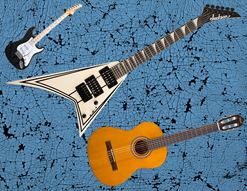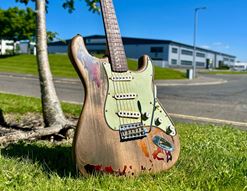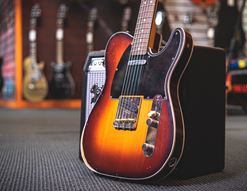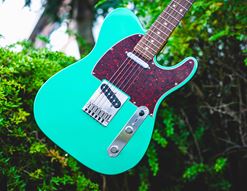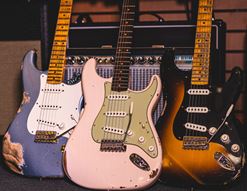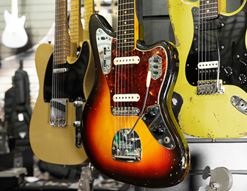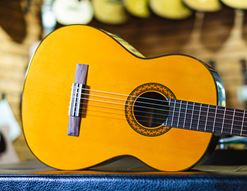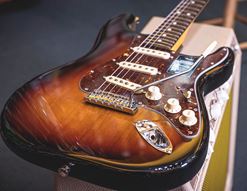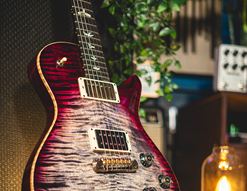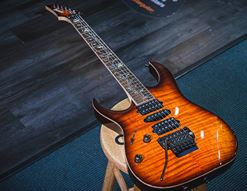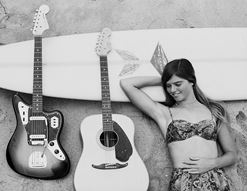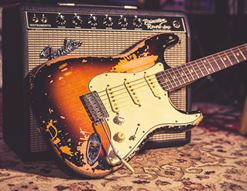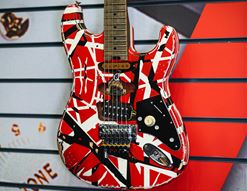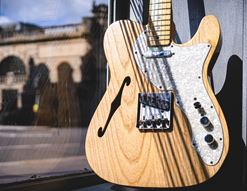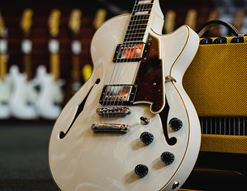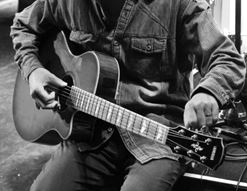Summer is almost here, folks! As soon as the sun comes out, our thoughts inevitably turn to travelling. The great outdoors. Hanging with friends in scenic places, maybe even doing some camping? Some of us will be heading to festivals, too, where there’s a wonderful culture for campfire storytelling and singalongs.
In short, we are approaching the season when our guitar playing heads outside and into the world at large. Whether you like the company of groups or prefer to be in solitude, there’s something special about playing the guitar outside in the open air. If you haven’t done this before, then I definitely encourage you to give it a try as soon as you can! Read on to find out why, and also to get the lowdown on which guitars might be best suited to taking with you this summer, wherever you find yourself going.

Contents
Choosing a Guitar for Travelling
Small or Cheap or Small & Cheap
Good Travelling Guitars: My Recommendations
Why Play Guitar Outside?
Firstly, let’s talk about playing outdoors and why you might want to. Whether it's at a campsite somewhere with friends, at a festival campfire or indeed way out in the wilderness, here are some of the benefits of playing guitar outdoors:
- You are instantly on a stage, as it were. You are on performer mode, whether you have an audience or not. Playing to the trees and the birds is absolutely a thing.
- It’s an entirely different headspace from playing indoors: chords and rhythm matter more than anything.
- Your whole concept of how sound behaves will change: depending on your immediate environment (including number of people), your guitar sound can travel for miles or sound incredibly quiet.
- Landscapes are inherently inspiring, so you may find yourself creating lots of new music.
- If you’re part of a group who loves music then you’ll be providing a special experience for people.
- You’ll be playing to people who might not otherwise get to hear you (even friends!)
- Music always adds an extra dimension to any experience: why not be at the centre of that?
- Not everybody can play, so it's an inclusive and generous way of sharing your talent.
- It’s just really good fun and feels liberating!

Choosing a Guitar for Travelling
So, the idea of taking a travel guitar along with you this summer sounds good, right? Okay, but which guitar? Should you buy a new one? If so, what should you buy? I’ll answer all of these questions, based on personal experience and some old-fashioned common sense.
Small or Cheap or Small & Cheap
This is the main debate really, isn’t it? Should you take an expensive guitar outside into the elements with you? Well, there’s no reason why the guitar itself will have any problems, as long as you don’t leave it inside a roasting hot car (or tent), or have it sat too close to any fires. Anything that would cause distress to a guitar inside will be the same outside, really. If you are concerned about theft or accidents, then by all means leave your pride and joy at home and check out the guitars I’m recommending below.
Also, I’ve noticed that the smell of smoke and barbecues can stick around on some guitars for a while. If that’s not ideal, consider things like cleaning the guitar, keeping it in a gig bag whilst out, and even just placing yourself upwind from anything like that.
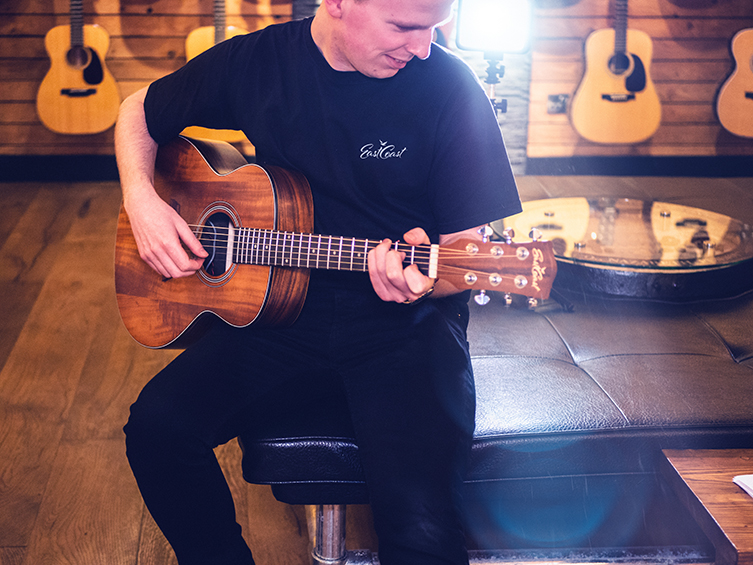
In terms of size, this is where things become interesting. Consensus agrees that, generally speaking, larger-bodied acoustic guitars sound bigger and louder than smaller ones, right? That is generally true, but environmental/social circumstances can really alter the volume of guitars. In the depths of night in the wilderness, the quietest travel guitar can sound louder than a symphony orchestra; and at a campfire with twelve people singing, even the sturdiest jumbo guitar can vanish into the background noise. These are things you’ll notice for yourself.
Smaller-bodied guitars are obviously more portable, and so if you are carrying everything you need with you, it hardly makes sense to cart around a large guitar if you don’t have to.
So, what to do? It seems that there are plusses and minuses for each choice. What would I do? Well, I have some advice here…
You have a car nearby: If you are driving right up to your campsite, then I’d recommend a cheap dreadnought or concert-sized acoustic. Size isn’t an issue if you aren’t carrying your guitar for miles, and you’ll likely enjoy playing (and hearing) a full-sized guitar over something smaller.
You are part of a larger group: If your aim is to play at a campfire, you might actually be surprised how much volume is made by a small number of singers, sober or otherwise! Small guitars can sometimes be drowned out by vocals in this situation. You may be fine with that, but it’s worth knowing either way.
You are by yourself: If you are on your own, you need something particularly small. Portability is the number one consideration here. There isn’t anything much smaller than a Martin Backpacker, and the bonus is that it’ll easily fit in an aeroplane’s overhead compartment, too!
You want an all-rounder for home use too: lots of people want one acoustic guitar that can reasonably handle all jobs, from practising to recording to performing, indoors and out. This is a tall order, though nowadays not an impossible one! I’ll show you a few guitars today that can manage this, most of which have come around as a response to the overwhelming popularity of the Taylor GS Mini. I’d nominate the GS Mini as the ideal solution here, and I’ll expand on that later in the article. A somewhat downsized acoustic with lots of volume and projection is what you want for a jack-of-all-trades.
Small & cheap: referring to the heading of this section, I feel that you’ll be less precious and concerned about dings and scratches if you just opt for something very affordable and of a smaller size. I’ll introduce you to a few models soon, but unless you really need to be making a big noise (and do you really?) then a small, ultra-affordable acoustic guitar seems to be the way ahead. Let’s get some perspective here: your companions are unlikely to be impressed by things like branding or timber quality, so expel those things from the exercise and the whole task becomes a lot simpler! Do you need a solid top? Maybe you do, maybe you don’t, but make sure you know your mind on this.
Good Travelling Guitars: My Recommendations
Right then. You’ve decided to purchase a new guitar for the purposes of playing in the great outdoors, and you’ve read through the previous sections. Now it’s time to put together a shortlist of guitars to consider. I have chosen the following instruments for varying reasons, so take a second to see which one best meets your needs…
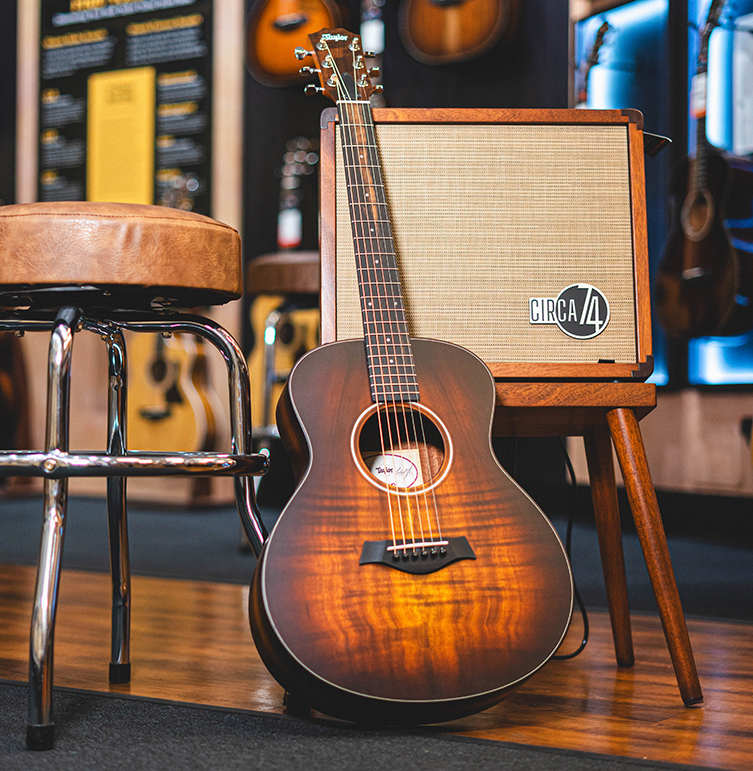
Taylor GS Mini: This is an obvious choice and I’ve mentioned it already, but there’s really very little to fault with the GS Mini. Whilst it isn’t a cheap guitar, it’s not crazy expensive either, and it is of high enough quality to serve as your only acoustic guitar, if you so wish. Here’s my rundown of why the GS Mini is a very good solution…
- Big enough to project well (and loudly!) but small enough to be portable
- Taylor design know-how means that the feel and tone are very impressive
- Does not sound like a travel guitar! The GS Mini has a full voice.
- Will certainly work well for your go-to ‘house guitar’
- Available in a large number of finishes, tonewood varieties and versions with a pickup
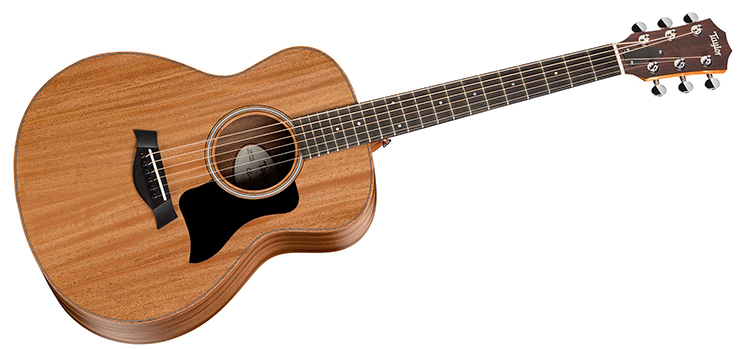
Now, the GS Mini is a great guitar, but it’s by no means the only choice. In fact, for some, the GS Mini may not be an option at all: it may not be small enough for you (or indeed, it may be too small!) and it may cost more than you’d like to sink into a ‘travel guitar’, even though it can be a lot more than that. So, please let me show you a few more, and I’ll discuss their relative merits and drawbacks…
Cort AF505M: This is a LOT of guitar here for very little outlay. Even if you’re a very experienced acoustic player, I expect you’ll be impressed at what Cort are offering for the money. You can have a dreadnought or a concert body, and each has a tactile open pore finish. This guitar, whilst not ‘travel-size’, does feel compact and easy to play. In fact, its regular size will make it easier to cut through the amassed voices of a campfire singalong, so keep that in mind when weighing this up against smaller-bodied guitars. There’s no solid top but the price is very low and the guitar still has a pleasant, useful voice.
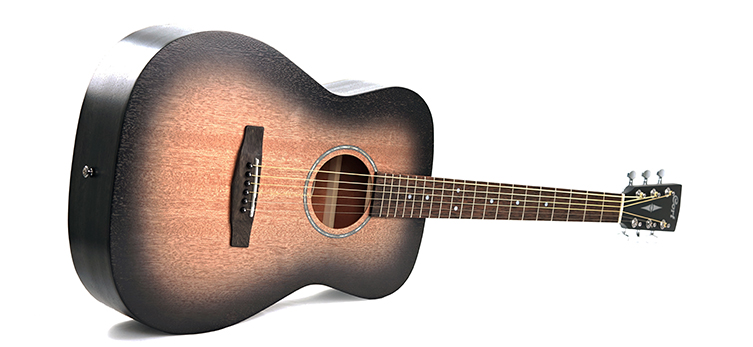
If you want cheap and effective, this is it!
EastCoast M1S: EastCoast are always high on the value too, and this particular guitar scores highly by the inclusion of a solid spruce top (or mahogany if you choose the M1SM model). I feel like this elevates the instrument - which is roughly similar in size to the Taylor GS Mini - above its price point. It deserves to be seen as a contender, particularly if you plan on using it for a number of years, since the solid top will ‘season’ and improve over the years.
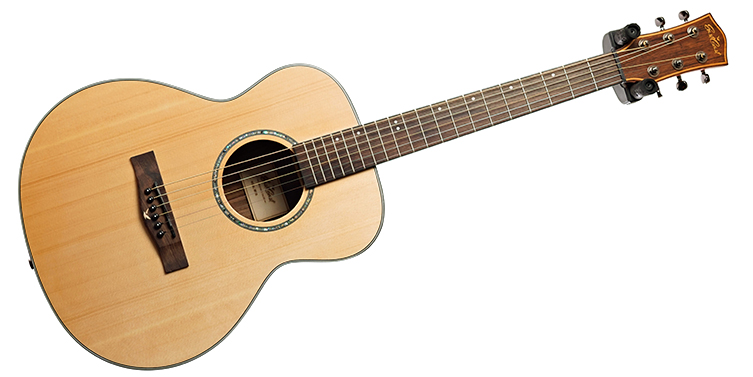
Martin Backpacker: I spoke about this one already, and it’s a great choice for the musician on the move. It’s a unique looker, and takes up very little comparative space (you get a custom soft bag with it), so it’s a true travelling guitar. One thing I’d mention: it obviously isn’t going to sound like a D28! I think it’s pointless to compare its sound with full-on acoustic guitars, because the Backpacker is an entirely different prospect. What it does, it does really well.
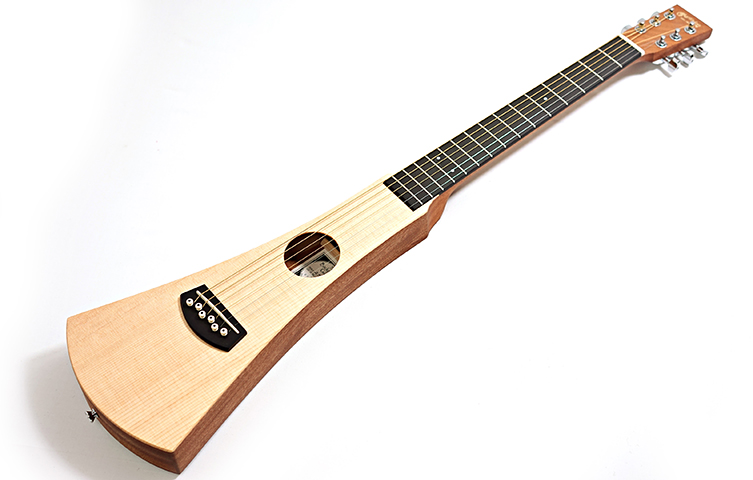
Alvarez LJ2: For those of you intrigued by the GS Mini but looking to spend less, this offering from Alvarez may restore your excitement. Alvarez are a brand that keep impressing me with their rigorous designs and attention to detail. They don’t cheap out on features, and so the value built into each guitar is excellent.
This model - the Alvarez LJ2 - is a downsized Jumbo and features a solid spruce top with layered mahogany back & sides. There is special forward-shifted bracing to keep the sound clear and bright (no muddiness here) and there’s a gig bag included, too!
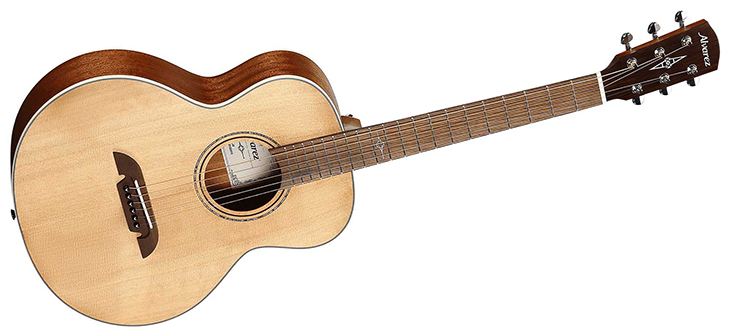
I think this guitar will suit a great deal of travellers who want something nice to play on, without hurting the bank too much. It’s a legit proposition for any situation that requires an acoustic guitar; it’s just also small enough to be eminently portable.
More to Look At
Those are my main choices for good campfire, festival and travel guitars, but I concede that there is a large market out there, filled with very good guitars. I would also recommend the following as more than worthy answers to your travel guitar queries…
- Yamaha JR2
- Martin Junior Series
- Fender Sonoran Mini
- EastCoast D1
- Yamaha APXT2
- Taylor Baby Taylor BT2
The list goes on, and each has its own appeal. As ever, I recommend taking these tips as a starting point for your own investigations. Try a bunch out, and go with what speaks directly to your ears, your fingers and your bank account!
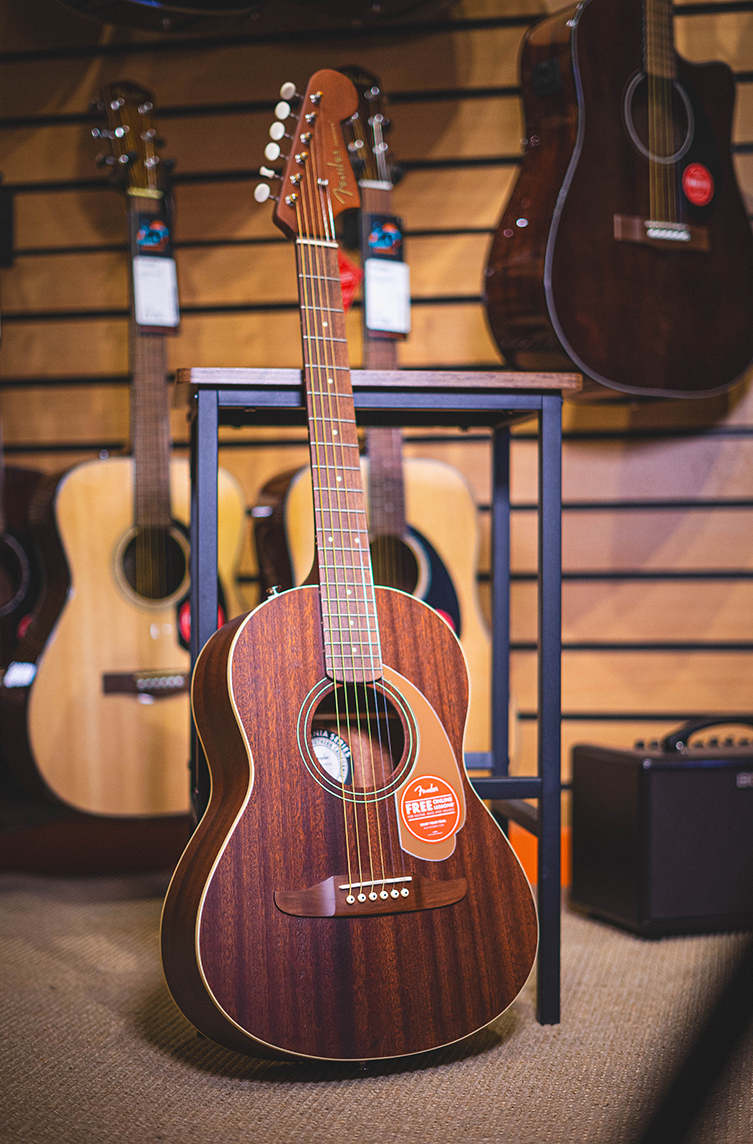
It’s a Big Wide World
Only you can really judge whether you need a smaller guitar, a louder guitar, or any other type of guitar to travel with. Only you can tell whether you’ll be fine with something cheap & cheerful, or whether it has to have great quality built in, regardless of where it’s intended to be going.
I hope I’ve covered most eventualities for you in terms of guitar choices: I have stuck to steel string acoustics since they are the overwhelmingly more popular style, but you can certainly have travel guitars with nylon strings too! Our staff will be happy to chat to you about those as well, though their inherent lack of a truss rod sometimes makes me feel that steel string guitars are a better travel companion for temperature changes and so on.
Whatever you choose to do this summer, do it with your guitar. After all, everything is better with music!
Browse All of Our Travel Guitars


